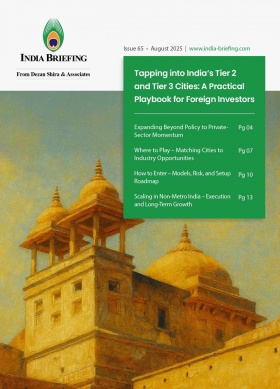RBI Extends Export Proceeds Repatriation Timeline for IFSC Accounts
In line with India’s ongoing measures to enhance the ease of cross-border trade and payments, the Reserve Bank of India (RBI) has introduced amendments to key Foreign Exchange Management (FEMA) regulations.
The latest amendments cover two primary areas – extension of timelines for repatriation of export proceeds and lending in Indian Rupees to neighboring countries. These updates aim to promote greater flexibility in trade financing and streamline export-related transactions.
RBI extends repatriation period for export proceeds
The Reserve Bank of India (RBI) has amended the Foreign Exchange Management (Foreign Currency Accounts by a Person Resident in India) Regulations, 2015, allowing exporters to retain export proceeds in foreign currency accounts maintained with banks outside India up to three months.
The amendment clarifies that foreign currency accounts opened in International Financial Services Centres (IFSCs) will now be treated as accounts “outside India” for regulatory purposes. However, for accounts maintained with banks in jurisdictions other than IFSCs, the existing rule continues to apply, i.e., requiring utilization or repatriation of funds within one month.
According to the RBI’s notification, funds in the IFSC-based account may be utilized by the exporter for paying for its imports into India or repatriated into India within three months. The time period will be calculated from the date of receipt of funds, after accounting for any forward commitments.
This regulatory update was issued on October 6, 2025, and forms part of the RBI’s objective to facilitate external trade and payment flexibility under the evolving foreign exchange framework.
Enhanced flexibility for exporters with IFSC accounts
The amendment is expected to provide greater operational flexibility for exporters, particularly those dealing with high-value foreign currency transactions, such as in the gems and jewelry sector, where extended retention periods support smoother financial management and settlement cycles.
By permitting the holding of export proceeds for up to three months in IFSC-based accounts, exporters can better manage their foreign currency exposure, reduce conversion-related costs, and optimize treasury operations.
Previously, under the Exchange Earners’ Foreign Currency (EEFC) account scheme, exporters were required to convert non-utilized balances into Indian Rupees by the end of the following month. This often resulted in frequent, suboptimal conversions, higher exchange rate risks, and increased administrative workload.
Industry observers view the new measure as a pragmatic step towards aligning India’s foreign exchange regime with international best practices while strengthening the role of IFSCs as hubs for trade-related financial activities. Going forward, experts emphasize the importance of clear compliance guidelines, robust monitoring mechanisms, and greater exporter awareness to ensure effective implementation under the Foreign Exchange Management Act (FEMA) framework.
CLICK HERE TO KNOW MORE: FEMA Compliance Guide for Foreign Investment in India
Caution and compliance requirements
While the new framework offers greater flexibility, exporters maintaining accounts outside IFSCs must continue to exercise strict financial discipline to meet the existing one-month repatriation requirement.
The amendment also shows the growing importance of the IFSCs as international financial hubs, providing Indian exporters with a regulated alternative to offshore banking arrangements. However, compliance obligations remain rigorous. Exporters are required to ensure that these accounts are used solely for legitimate export-related transactions, supported by complete documentation and trade-linked records.
Adherence to Know Your Customer (KYC) norms and the maintenance of transparent audit trails are critical. Any misuse of funds or delay in repatriation beyond the stipulated period could attract regulatory scrutiny and potential enforcement action from authorities.
Lending in INR to neighboring countries
Through the Foreign Exchange Management (Borrowing and Lending) (Amendment) Regulations, 2025, notified on October 6, 2025, the central bank has permitted Authorized Dealer (AD) banks in India and their overseas branches to extend loans in INR to residents and banks in Bhutan, Nepal, and Sri Lanka.
This regulatory amendment aims to facilitate smoother cross-border trade transactions and promote regional financial cooperation. By enabling INR-denominated lending, the RBI seeks to enhance the Indian currency’s role in regional trade settlements, reduce dependence on third-country currencies, and strengthen monetary linkages with neighboring economies.
Key takeaway
The recent amendments reflect India’s focus on streamlining foreign exchange operations and enhancing trade facilitation. Additionally, expanding INR-based lending to neighboring economies and extending flexibility for exporters in managing foreign currency accounts reinforce India’s focus on supporting external trade, regional financial linkages, and the growing IFSC ecosystem.
About Us
India Briefing is one of five regional publications under the Asia Briefing brand. It is supported by Dezan Shira & Associates, a pan-Asia, multi-disciplinary professional services firm that assists foreign investors throughout Asia, including through offices in Delhi, Mumbai, and Bengaluru in India. Dezan Shira & Associates also maintains offices or has alliance partners assisting foreign investors in China, Hong Kong SAR, Vietnam, Indonesia, Singapore, Malaysia, Mongolia, Dubai (UAE), Japan, South Korea, Nepal, The Philippines, Sri Lanka, Thailand, Italy, Germany, Bangladesh, Australia, United States, and United Kingdom and Ireland.
For a complimentary subscription to India Briefing’s content products, please click here. For support with establishing a business in India or for assistance in analyzing and entering markets, please contact the firm at india@dezshira.com or visit our website at www.dezshira.com.
- Previous Article GST on Contract Employee Remuneration: Applicability, Rates, ITC, and Compliance
- Next Article Invest in South India: Unlocking Opportunities for Multinational Firms












